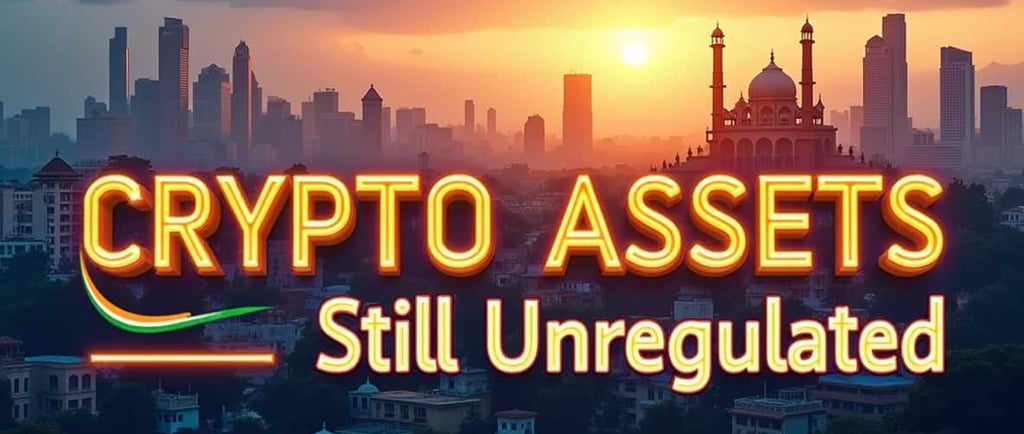Crypto Assets Still Unregulated in India: What It Means for Investors
Crypto assets remain unregulated in India, leaving investors uncertain. Here's what the legal grey zone means for your money, taxes, and future decisions.
CRYPTO
Ayushi
7/30/2025


Introduction: A Booming Industry in a Legal Gray Area
India has one of the world's fastest-growing bases of crypto investors — over 25 million active users, growing youth adoption and millions flooding into exchanges like CoinDCX, WazirX, and CoinSwitch. Even with such explosive growth, however, there remains one big problem:
Crypto assets are not officially regulated here in India currently.
There is no official law declaring cryptocurrencies legal or illegal, no watch body to oversee them, and no transparent protection of the investors. It is this vacuum of law that generates confusion, fear, and uncertainty — even as Indians keep investing in Bitcoin, Ethereum, and altcoins.
So what does this lack of regulation imply to the ordinary investor? Is your money secure? What are the taxes? Could a policy change destroy your portfolio?
Alright, let's head into it.
Why is crypto not regulated in India yet?
The Indian government has been reluctant and slow to regulate crypto. The Reserve Bank of India made a strong warning, likening cryptocurrencies to Ponzi schemes, and the Finance Ministry proposed a Digital Rupee through the RBI.
But to actually enact legislation? There still isn't any actual crypto regulation that's been voted on in Parliament as of mid-2025.
Here's why:
Lack of agreement: Different government wings are in disagreement — RBI wants prohibition; the Finance Ministry wants regulation.
Tax-first policy: Instead of regulating crypto use, India has chosen to tax crypto heavily, earning revenues but not accepting crypto assets legally.
Global uncertainty: India is holding back crypto policy moves by large economies like the EU and US before making its move.
What Does 'Unregulated' Actually Mean for Investors?
Let's be precise — unregulated does not mean illegal, but it does not mean protected either. It means that crypto is outside the formal legal framework.
So here's how that impacts you:
You can freely purchase, hold, and sell cryptocurrency.
No law prevents Indian residents from exchanging cryptocurrency. Exchanges are operating legally within self-imposed compliance guidelines.
But you have no legal protection
If an exchange goes down, freezes withdrawals, or you lose money because of a scam — you cannot seek recourse with SEBI, RBI, or any other financial regulator.
No recourse for hacks or scams
So, since crypto isn’t considered an asset or security, there’s no specific system to help you if you get scammed or if an exchange messes up.
What are the taxes on Crypto in India?
So, in 2022, India imposed a flat 30% tax on crypto profits, and the same is the scenario in 2025 too. They treat crypto profits as lottery or gambling winnings, so the taxation is quite strict.
Crypto Tax Breakdown:
A 30 percent tax on profit—no loopholes, no deductions, not even on those transaction charges.
1% TDS (Tax Deducted at Source) on all transactions over ₹10,000 annually.
No loss set-off allowed — You cannot set-off your losses in crypto against gains in stocks or other investments.
So, even though India hasn't really set rules for crypto stuff, they're super keen on taxing it. Investors are usually like, how do you even tax something that’s not legal yet?
What If the Government Suddenly Bans Crypto?
This is the biggest fear of Indian investors: What if crypto is banned in one night?
While that is unlikely in 2025 (as India currently raises significant tax revenue from it), the absence of regulation keeps the possibility theoretically afloat. Here's how it could go down:
Assets tied up in Indian exchanges
Withdrawal inhibited
Severe sanctions on subsequent deals
Forced liquidation or migration into foreign wallets
Because there is no law to safeguard investors, your funds would be at risk if that happens.
How Crypto Exchanges in India Are Impacted
Indian exchanges such as CoinDCX, WazirX, and CoinSwitch exist in a self-regulated environment, adopting:
Strict KYC/AML filtering
Tax reporting tools for users
Global compliance partners
But without any official approval from RBI or SEBI, they are running at the government's mercy. That implies:
Banks can continue to cut service abruptly (as they have in previous years)
RBI can impose informal restrictions
International partnerships may also be limited by ambiguity regarding regulation
How Investors Are Reacting to the Unregulated Status
Despite the absence of legal certainty, Indian investors have not ceased trading. Indeed, most are embracing new tactics to deal with it
Going into self-custody
Increasing numbers of investors are shifting capital from Indian exchanges to hardware wallets or international DeFi platforms.
Using foreign exchanges
Platforms such as Binance and KuCoin — while not actually regulated in India — are utilized by investors looking for greater crypto exposure.
Seeking tax advisors
Crypto-oriented CA companies and tax experts are becoming busier as people are trying to remain legitimate despite all the confusing regulations.
How This Unregulated Space Impacts Institutions and Startups
The largest losers in this grey area are Indian Web3 startups and institutional investors.
Web3 startups
Capital mobilization challenges arising from ambiguous laws
Experience challenges in establishing crypto payment gateways
Regularly relocate to Dubai, Singapore, or Europe to work on one's own
Institutions
Indian banks cannot offer crypto-linked services
Mutual funds and ETFs shun crypto exposure because of the risk of regulations
Institutional adoption lags behind other countries by decades
What the government's cooking up next
There is a lot of discussion about India needing to introduce some official crypto regulations. Around mid-2025, the following is being discussed:
✅ Digital India Act (At draft stage)
There's this big bill that might lay out some rules for digital stuff, like crypto and NFTs.
✅ RBI's Digital Rupee expansion
Hence, the Central Bank Digital Currency (CBDC) will emerge alongside regulated private crypto, but not instead of it.
✅ Global cooperation via G20
India's G20 presidency saw an attempt at global standards of crypto regulation, proposing a move towards formalization.
So they are still in planning phase only. No legislation has been enacted yet.
What are Indian crypto investors to do now?
Until the regulation sets in, the best action is to be smart, cautious, and ready.
✔️ Remain compliant Always report your winnings and pay applicable taxes. Don't believe the grey area gives you a free pass.
✔️ Use reliable platforms Use reputable Indian or international exchanges with sound security and KYC standards.
✔️ Consider diversification Don't put all your money into crypto. Diversify as you would with any other investment.
✔️ Stay current Follow RBI, SEBI, and Finance Ministry news closely. Any news can impact your investments.
Conclusion:
Hope in Uncertainty India's crypto universe has reached the point where you simply can't deny it anymore — whether you are the government or an investor.
The absence of regulation does not mean that it's dead in India. It is actually stronger than ever, just as it's dangerous. But this lack of regulation jeopardizes the entire system.
Without legal status, crypto investors are vulnerable, and startups remain hesitant to expand. The ensuing 12 months may hold genuine change.
In the meantime, the most important thing is to remain vigilant, remain legal, and remain diversified. Crypto may be the future, but in India, it requires a little direction.
About Company


